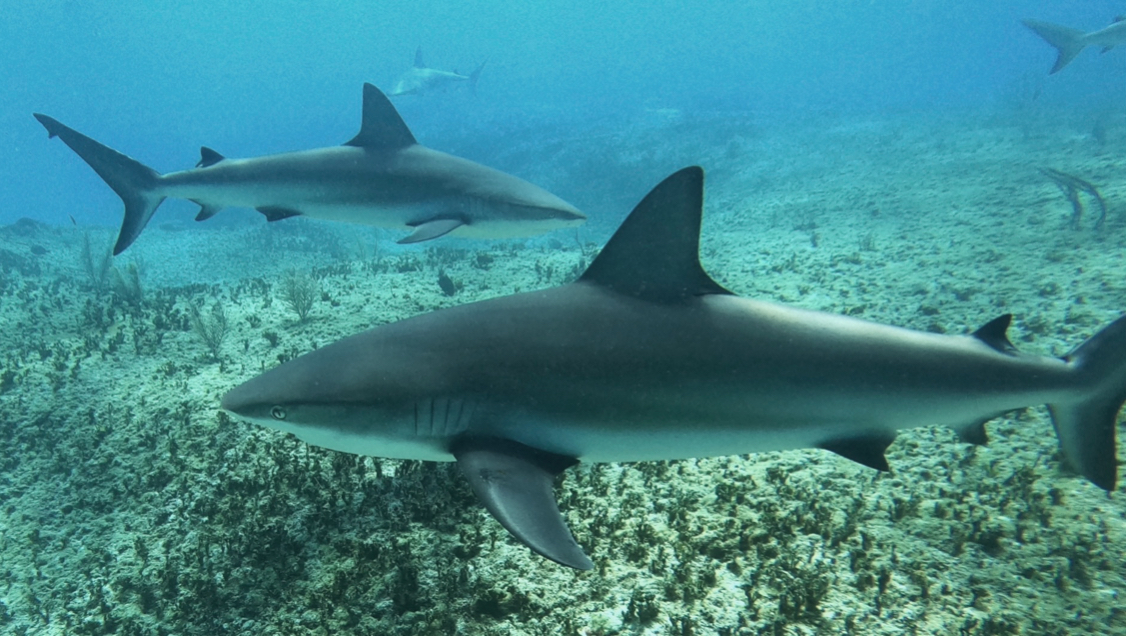Sophomore Paul Blanchet, an ILS sophomore who is a part of the Applied Global Leadership STEAM program, contributed this article which shares his undersea observations.
My Experience with Sharks
I was eleven years old when I first saw a shark in the wild. It was a nurse shark swimming over a reef off the coast of Miami, and it was an unforgettable experience. Ever since I became a scuba diver, I have always been finding ways to get to into the water with sharks big and small, safe, and risky. Every dive with sharks is its own new adventure from stepping off the boat and the world we all know into another world. Many people I meet think of this as plain foolhardy. For me, each dive with sharks is very much like a dream come true.
Background
Despite being labeled as “man eaters” or “mindless killers,” sharks are among the most successful creatures to have ever lived on Earth. Trees first appeared on Earth between 350 to 400 million years ago; however, sharks have been traversing the world’s oceans for over 450 million years. Sharks are a species of cartilaginous fish that belong to a group called the Elasmobranchs. In present day, over 500 individual species of sharks inhabit every ocean on Earth. Some species like the nurse shark or lemon shark inhabit warm water depths as shallow as ten feet, while other species like the frilled shark and the Portuguese dogfish inhabit freezing water at depths beyond thousands of feet.

Why are Sharks Important?
Like any other organism in an environment, sharks have a role to play in maintaining the health of the marine ecosystem. In the marine ecosystem, sharks (especially larger sharks) act as the apex predators, meaning that they regulate marine populations below them on the food chain. Smaller species of sharks, like reef sharks, typically hunt smaller carnivore fish including groupers and snappers. Meanwhile, larger sharks, like tiger sharks or white sharks, will go after larger animals like turtles or seals. Rather than target any prey at random, sharks will typically go for weaker prey, including the dead, dying, diseased, and unwary.
“They are like the cleanup crew. They are the ones who keep the entire food web in check,” said Mr. John Ierardi who has six years of diving experience and is a certified dive master as well as a marine science teacher at ILS.
By removing the sick and dead, sharks prevent disease from spreading throughout both the marine ecosystem and individual marine populations. Research has also shown that marine ecosystems with declining shark populations are often significantly weaker than ecosystems with healthy shark populations. Sharks are so crucial to the health of the marine ecosystem that scientists consider sharks to be bio-indindicators used to determine the health of the oceans.
Should We Fear Sharks?
Despite being portrayed as “man-eaters” or “mindless killers” in the movies, scientific evidence continues to prove that titles like these are completely false. According to the Florida Museum International Shark Attack File, only 91 shark bites were confirmed worldwide in 2023, with 69 of them being unprovoked bites and 22 being provoked ones. Out of those 91 confirmed cases, only 14 of them resulted in fatalities. This is with an estimated 75 million people entering the world’s oceans every year. In fact, no year as of 2024 has reached 100 confirmed shark attacks in one year.

“There’s a much higher chance one could be struck by lightning, involved in a car crash, or hit while riding a bike than being bitten,” explained Dr. Rebecca Shaw, ILS’s Director of STEAM and marine science teacher, who has worked on whale shark research in the past.
Mr. J.C. Moya, Chair of the Applied Global Leadership program at ILS, who has snorkeled with reef sharks before, called the interaction “exhilarating.”
Do not enter water if any type of bait or chum is in the water.
- If you see a shark while in the water, calmly make your way out of the water.
- Do not make any splashing or panic motions in the water if you see a shark.
- Do not fish or bait in areas where others are swimming.
Though sharks continue to be misperceived, they really are creatures who play a vital role in keeping Earth’s oceans healthy.
If you want to see where sharks travel and which species are found around Florida, check out these sites.








